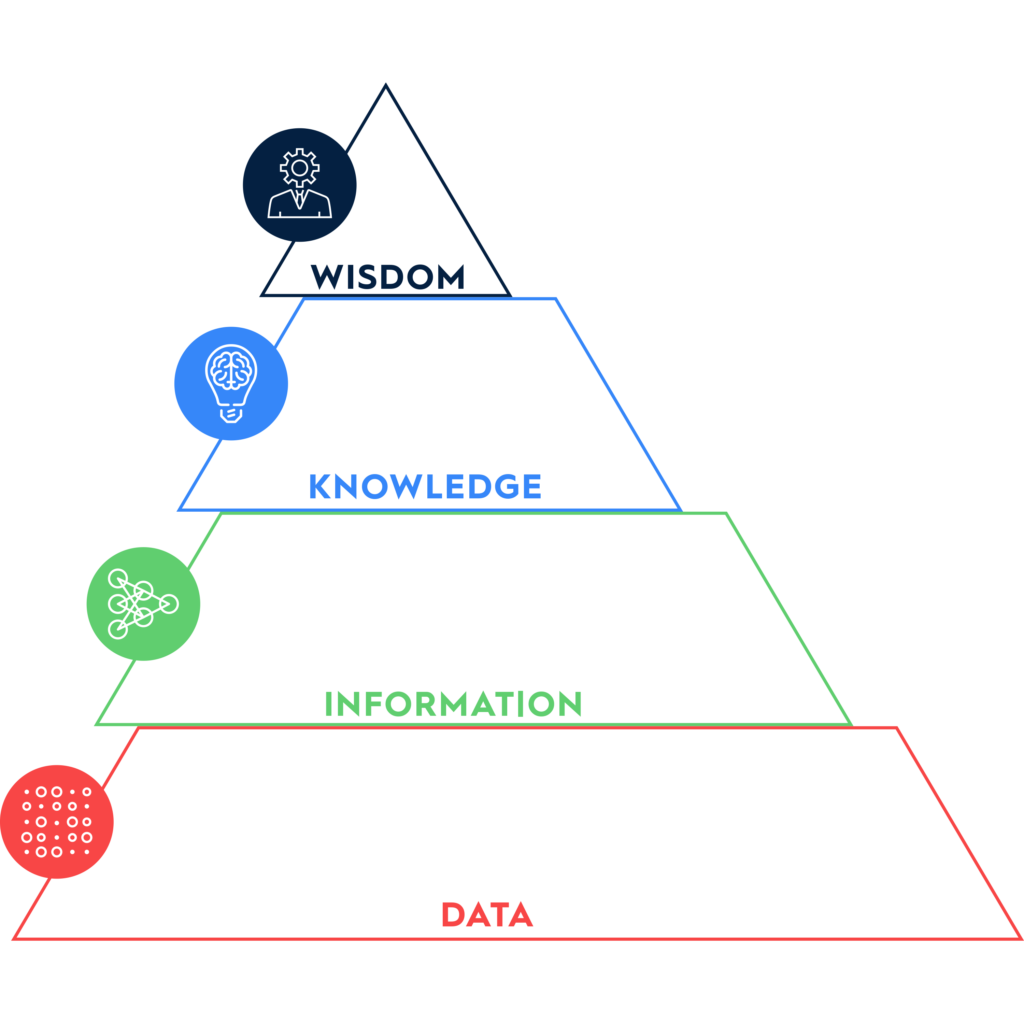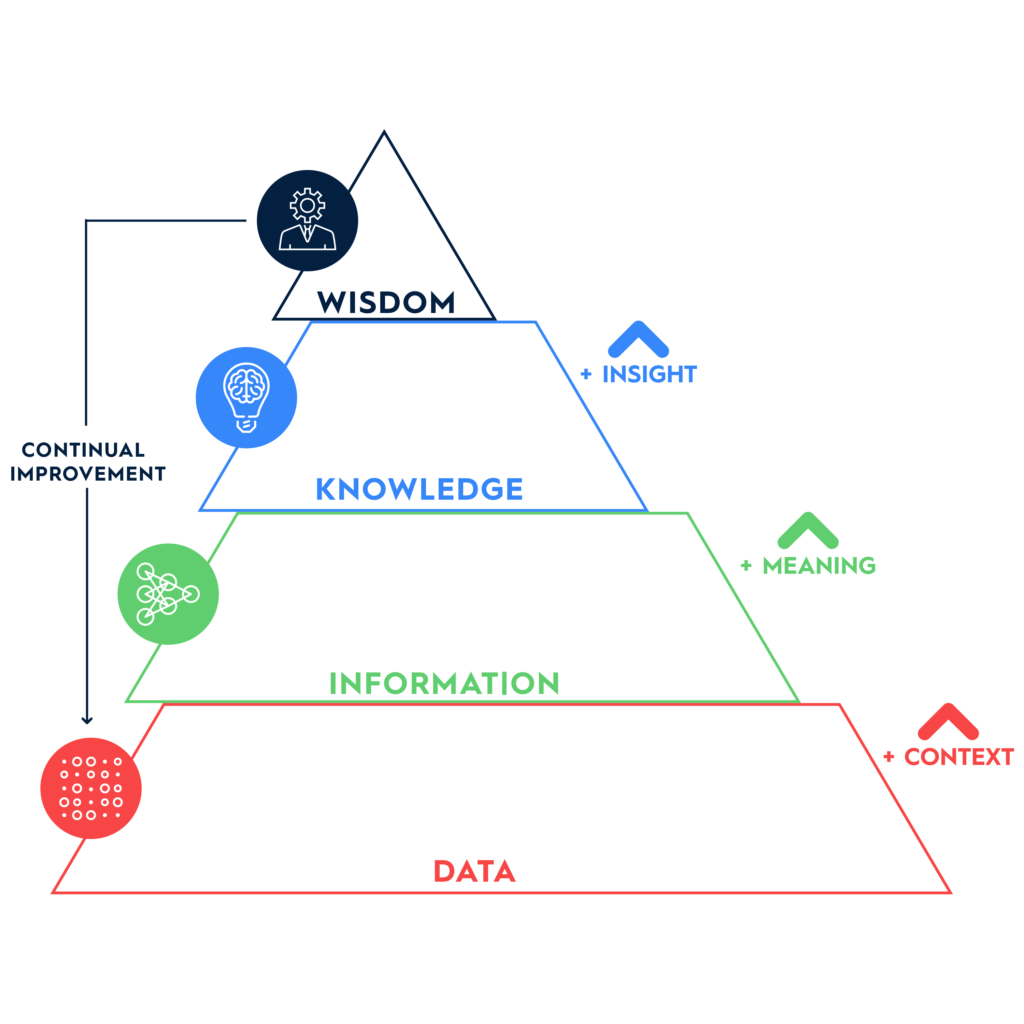
The D-I-K-W Model
The DIKW Pyramid represents the relationships between data, information, knowledge and wisdom.

Each building block is a step towards a higher level – first, there’s data, then information next comes knowledge and finally, we get to wisdom.
The steps of increasing complexification from less sophisticated to more sophisticated each adds value to the basic building block.
In this way, we can enrich our data with meaning and context to acquire valuable knowledge. In turn, this helps us make more informed decisions about how best to proceed based on the available resources at our disposal.
Let’s look at the individual levels of the pyramid through a supply chain lens…
Data
![]()
Data is an individual unit that contains raw materials which do not carry any specific meaning.
This data is a fundamental building block for businesses and without it, the rest of the pyramid cannot be built.
In the supply chain, common data challenges are:
Collection
Who collects and how data is collected from suppliers can be a laborious job without supplier self-serve portals.
Storage
How the data is stored can be a massive problem, with formatting issues potentially rendering the data unusable for the transformation purposes needed to drive the next level in the pyramid.
Governance
“Good” data should be:
- Accurate
- Consistent
- Complete
- Relevant
So, ensuring you have people, processes and platforms to minimise these data challenges is essential.
Information
![]()
The second of the four levels of the DIKW Pyramid demonstrates how data related to raw facts, can be turned into information after being transformed with context.
The more we enrich our data with meaning and context, the more insight we get out of it, so we can make better decisions in terms of what’s best to do next.
Data alone doesn’t tell us anything – only when it has been contextualised, will it carry any value in informing us about what’s best for our business or project.
Information is data that has been prepared or organised, cleaned, structured or processed in a way that allows us to visualise or analyse for a specific outcome.
The importance of this processing cannot be understated. Information (or structured data) gives the collected data meaning it didn’t have before.
The two challenges many organisations have with information are:
Storage
Revisiting the data building block, data storage is a critical part of modern data-driven businesses. If the data is not stored in a structured, organised single source of truth then it weakens the subsequent two stages of knowledge and wisdom massively.
Sharing
Silos, departments, project teams and individual colleagues can all collect vital information that may be essential for your knowledge and wisdom… the chances are, they simply don’t know it. Information access and sharing are important for making holistic, evidence-led decisions that can make or break productivity and profits.
It’s Time to Question Everything!
When you have information in a structured, organised, single cloud source that is accessible and sharable, this is where the fun begins. If you don’t have the information – you simply can’t move up the pyramid.
It’s essential that supply chain teams are curious about the information and ask those big ‘who’, ‘what’, ‘when’, ‘where’ questions that help make it useful for your objectives.
With the right information to hand, your teams can be empowered and fuelled to start building knowledge.
Knowledge
![]()
We left out one major question prefix above and this single word defines the value of the information you have within your organisation.
How.
This is where we begin to be strategic, forward-looking and proactive. If data and information are snapshots of past performance, certifications, accreditations and other time-bound facts, knowledge and wisdom is where we decide how to use those facts. What do we do with the information we have to hand?
Knowledge is how to interpret the information within the supply chain context.
Knowing how to apply the information you have to reach your objective is arguably the most important goal of any business and an incredibly valuable skill in supply chain management.
Knowledge can form a large part of competitive advantage but without the data and information to hand, there are many things we cannot know and therefore use in the future. This means more risks are taken.
An example is knowing that a particular supplier has performed poorly on 12/15 of the most recent projects. If information is siloed, we may have one team where all 3 of the satisfactory performances lead them into a false sense of security. Good information and data management should also contextualise where they have failed, why and perhaps when the failures occur.
Wisdom
![]()
Wisdom is knowledge in action. What will we do with this knowledge? How will we apply what we have learned?
Taking the example above of the underperforming supplier, this may:
- Trigger a review with the supplier in question
- Incite a process to re-engage other suppliers who are providing the same product/service
- Lead to seeking new suppliers to enhance the depth and breadth of supply
Without the data, information or knowledge – these issues are often not visible or being dealt with proactively. This leads to massive hits on productivity, efficiency, profitability, risk and quality.
Continual Improvement

Great businesses and therefore supply chains are built on continual improvement processes, which are generally summarised as define, measure, analyse, improve, control.
When you’re implementing your wise decisions, defined the objectives and measurement of success (KPI’s) you’ll then collect more data to analyse, improve and control future decisions.
You’ll know what worked, what didn’t, whether that supplier continued to perform poorly and then either try new strategies to improve them or be forced to take another “wise” path!
Knowledge becomes cumulative.
Your team will get better at… getting better.
SourceDogg empowers supply chain teams to make better, data-driven decisions.
We help our customers organise their data into information to unlock the potential in their people. This information drives knowledge, power, productivity and profitability through knowledge that powers wiser action.





